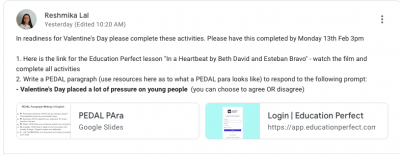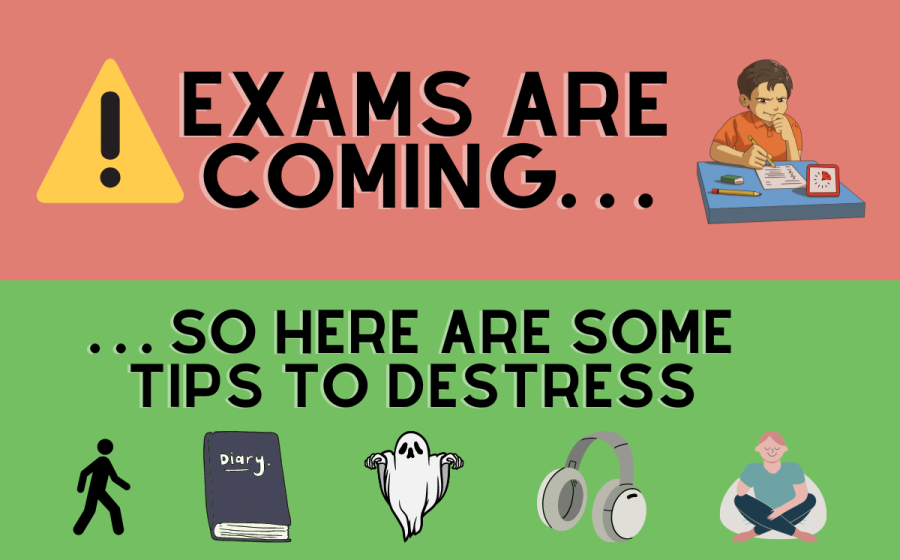10F1 English
Section outline
-
-
Hope this helps
-
Useful resources like - how when to use sophisticated punctuation, persuasive devices etc,
-
Response to written text conclusion
-
List of techniques you car refer to in a written text
-
Hope this helps
-
Useful resources like - how when to use sophisticated punctuation, persuasive devices etc,
-
Response to written text conclusion
-
List of techniques you car refer to in a written text
-
Hope this helps
-
Useful resources like - how when to use sophisticated punctuation, persuasive devices etc,
-
Response to written text conclusion
-
List of techniques you car refer to in a written text
-
Hope this helps
-
Useful resources like - how when to use sophisticated punctuation, persuasive devices etc,
-
Response to written text conclusion
-
List of techniques you car refer to in a written text
-
Opened: Saturday, 23 November 2024, 12:00 AMDue: Saturday, 30 November 2024, 12:00 AM
-
-

Kia ora 10F1. I hope you had a superb break and all ready to go. I am Mrs Lal and will be your English teacher. This week we will be spending time getting to know each other. This weekend we will also be marking Waitangi Day and so our focus will be on that.
Learning Intentions: We are learning to (WALT)...
- work together as team
- develop an understanding of expectations for English
Success Criteria: I can/have...
- complete the 'Getting to know" challenge
- write goals for self
- identify competitions that we would like to get into as a class
Activities:
- Getting to know each other
- Goals setting
- Reading Plus expectations
- Education perfect
Homework expectation
-
Kiaora Year 10's. This is a short week so we will go through some introductory activities.
Context: 'Kotahitanga' - Leadership, unity and collective action
MHJC Values :
Ako :
I have been guided to use a range of reasoning, evaluation & decision-making strategies (S2)
Wananga:
I can explain what I am learning and why. (S2) I can use evidence to explain where I am with my learning (S3)
I can explain my learning using GREAT Ako (S2) I have used a range of thinking and learning strategies/ scaffolds from GREAT Ako (S3)
I demonstrate the skills to work collaboratively with others (S2) I am a curious self-directed learner (S3)
I use learning intentions and success criteria to make learning goals/targets (S2) I use success criteria to track progress and check work - self/peer assessor (S3)
EXPLORE / TŪHURA learning intentions:
- We are EXPLORING the concept of 'Kotahitanga' - Leadership, unity and collective action by analysing and interpreting the power relationships in literature, language and texts
- We are EXPLORING the concept of 'Kotahitanga' - Leadership, unity and collective action byrecognising that texts help us understand what it means to be human and to empathise with others
- We are EXPLORING the concept of 'Kotahitanga' - Leadership, unity and collective action by interpreting the bias that exists in texts
- We are EXPLORING the concept of 'Kotahitanga' - Leadership, unity and collective action by recognising that these biases have their own political, material, and social interests that inform their purposes.
- We are EXPLORING the concept of 'Kotahitanga' - Leadership, unity and collective action by evaluating competing interpretations of a text, including my own, using analytical lenses to make informed judgments about the text
- We are EXPLORING the concept of 'Kotahitanga' - Leadership, unity and collective action by identifying, discussing, and debating how texts present particular versions of the world, supporting my arguments with pertinent evidence
- We are EXPLORING the concept of 'Kotahitanga' - Leadership, unity and collective action by redesigning texts in response to my critical analysis by, for example, adopting alternative interpretations, challenging understandings, or applying analytical mode
Success Criteria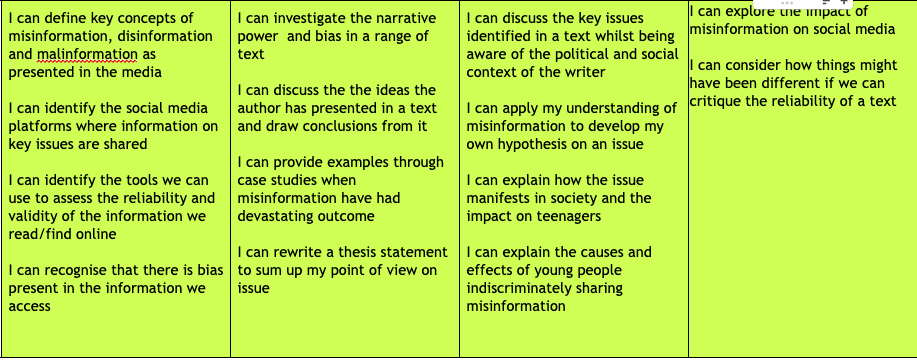
Activities:
- Refer to Google CLassroom
Further Learning:
Reading Plus
-
Kiaora Year 10's. This week we will be exploring the presence of bias in text
Context: 'Kotahitanga' - Leadership, unity and collective action
MHJC Values :
Ako :
I have been guided to use a range of reasoning, evaluation & decision-making strategies (S2)
Wananga:
I can explain what I am learning and why. (S2) I can use evidence to explain where I am with my learning (S3)
I can explain my learning using GREAT Ako (S2) I have used a range of thinking and learning strategies/ scaffolds from GREAT Ako (S3)
I demonstrate the skills to work collaboratively with others (S2) I am a curious self-directed learner (S3)
I use learning intentions and success criteria to make learning goals/targets (S2) I use success criteria to track progress and check work - self/peer assessor (S3)
EXPLORE / TŪHURA learning intentions:
- We are EXPLORING the concept of 'Kotahitanga' - Leadership, unity and collective action by analysing and interpreting the power relationships in literature, language and texts
- We are EXPLORING the concept of 'Kotahitanga' - Leadership, unity and collective action byrecognising that texts help us understand what it means to be human and to empathise with others
- We are EXPLORING the concept of 'Kotahitanga' - Leadership, unity and collective action by interpreting the bias that exists in texts
- We are EXPLORING the concept of 'Kotahitanga' - Leadership, unity and collective action by recognising that these biases have their own political, material, and social interests that inform their purposes.
- We are EXPLORING the concept of 'Kotahitanga' - Leadership, unity and collective action by evaluating competing interpretations of a text, including my own, using analytical lenses to make informed judgments about the text
- We are EXPLORING the concept of 'Kotahitanga' - Leadership, unity and collective action by identifying, discussing, and debating how texts present particular versions of the world, supporting my arguments with pertinent evidence
- We are EXPLORING the concept of 'Kotahitanga' - Leadership, unity and collective action by redesigning texts in response to my critical analysis by, for example, adopting alternative interpretations, challenging understandings, or applying analytical mode
Success Criteria
Activities:
- Refer to Google CLassroom
Further Learning:
Reading Plus
-
Kiaora Year 10's. This week we will be comparing and constarting the narrative perspective of Witi Ihimaera and Katherine Mansfield
Context: 'Kotahitanga' - Leadership, unity and collective action
MHJC Values :
Ako :
I have been guided to use a range of reasoning, evaluation & decision-making strategies (S2)
Wananga:
I can explain what I am learning and why. (S2) I can use evidence to explain where I am with my learning (S3)
I can explain my learning using GREAT Ako (S2) I have used a range of thinking and learning strategies/ scaffolds from GREAT Ako (S3)
I demonstrate the skills to work collaboratively with others (S2) I am a curious self-directed learner (S3)
I use learning intentions and success criteria to make learning goals/targets (S2) I use success criteria to track progress and check work - self/peer assessor (S3)
EXPLORE / TŪHURA learning intentions:
- We are EXPLORING the concept of 'Kotahitanga' - Leadership, unity and collective action by analysing and interpreting the power relationships in literature, language and texts
- We are EXPLORING the concept of 'Kotahitanga' - Leadership, unity and collective action byrecognising that texts help us understand what it means to be human and to empathise with others
- We are EXPLORING the concept of 'Kotahitanga' - Leadership, unity and collective action by interpreting the bias that exists in texts
- We are EXPLORING the concept of 'Kotahitanga' - Leadership, unity and collective action by recognising that these biases have their own political, material, and social interests that inform their purposes.
- We are EXPLORING the concept of 'Kotahitanga' - Leadership, unity and collective action by evaluating competing interpretations of a text, including my own, using analytical lenses to make informed judgments about the text
- We are EXPLORING the concept of 'Kotahitanga' - Leadership, unity and collective action by identifying, discussing, and debating how texts present particular versions of the world, supporting my arguments with pertinent evidence
- We are EXPLORING the concept of 'Kotahitanga' - Leadership, unity and collective action by redesigning texts in response to my critical analysis by, for example, adopting alternative interpretations, challenging understandings, or applying analytical mode
Success Criteria
Activities:
- Refer to Google CLassroom
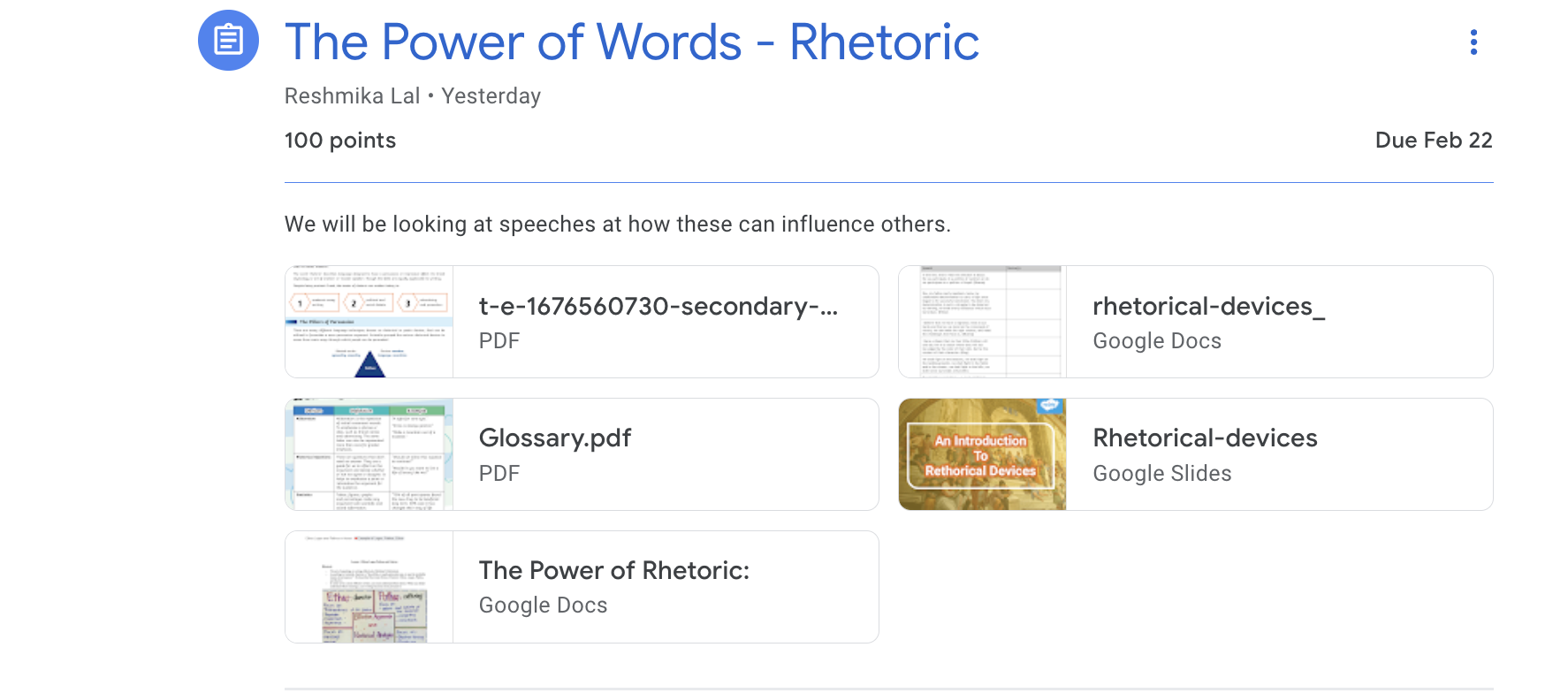
Further Learning:
Reading Plus
-
Kiaora Year 10's. This week we will be comparing and constarting the narrative perspective of Witi Ihimaera and Katherine Mansfield
Context: 'Kotahitanga' - Leadership, unity and collective action
MHJC Values :
Ako :
I have been guided to use a range of reasoning, evaluation & decision-making strategies (S2)
Wananga:
I can explain what I am learning and why. (S2) I can use evidence to explain where I am with my learning (S3)
I can explain my learning using GREAT Ako (S2) I have used a range of thinking and learning strategies/ scaffolds from GREAT Ako (S3)
I demonstrate the skills to work collaboratively with others (S2) I am a curious self-directed learner (S3)
I use learning intentions and success criteria to make learning goals/targets (S2) I use success criteria to track progress and check work - self/peer assessor (S3)
EXPLORE / TŪHURA learning intentions:
- We are EXPLORING the concept of 'Kotahitanga' - Leadership, unity and collective action by analysing and interpreting the power relationships in literature, language and texts
- We are EXPLORING the concept of 'Kotahitanga' - Leadership, unity and collective action byrecognising that texts help us understand what it means to be human and to empathise with others
- We are EXPLORING the concept of 'Kotahitanga' - Leadership, unity and collective action by interpreting the bias that exists in texts
- We are EXPLORING the concept of 'Kotahitanga' - Leadership, unity and collective action by recognising that these biases have their own political, material, and social interests that inform their purposes.
- We are EXPLORING the concept of 'Kotahitanga' - Leadership, unity and collective action by evaluating competing interpretations of a text, including my own, using analytical lenses to make informed judgments about the text
- We are EXPLORING the concept of 'Kotahitanga' - Leadership, unity and collective action by identifying, discussing, and debating how texts present particular versions of the world, supporting my arguments with pertinent evidence
- We are EXPLORING the concept of 'Kotahitanga' - Leadership, unity and collective action by redesigning texts in response to my critical analysis by, for example, adopting alternative interpretations, challenging understandings, or applying analytical mode
Success Criteria
Activities:
- Refer to Google CLassroom

Further Learning:
Reading Plus
-
Kiaora Year 10's. This week we will be comparing and constarting the narrative perspective of Witi Ihimaera and Katherine Mansfield
Context: 'Kotahitanga' - Leadership, unity and collective action
FOCUS / ARONGA learning intentions:
- We are FOCUSING on the concept that language is not neutral and that all uses of it (including my own) involve power, and it is often actively contested as people seek to shape meaning according to their social and political interest by developing an understanding the bias that exists in text including cultural and political bias
- We are FOCUSING on the concept that language is not neutral and that all uses of it (including my own) involve power, and it is often actively contested as people seek to shape meaning according to their social and political interest by explaining the source and purpose of bias in text and the tools used to create this
- We are FOCUSING on the concept that language is not neutral and that all uses of it (including my own) involve power, and it is often actively contested as people seek to shape meaning according to their social and political interest by evaluating competing interpretations of a text, including my own, using analytical lenses to make informed judgments about the text
Activities:
- One Pager
- Character Analysis - use template on GC
- Refer to Google CLassroom
Further Learning:
Reading Plus
-
Kiaora Year 10. This week we will begin unpacking the cultural, social and political factors that shaped Mansfield's telling of the " The Kidnapping of Pearl Button" and contrast it with the modern retelling of the story by Ihimaera in "The affectionate Kidnappers"
FOCUS / ARONGA learning intentions:
- We are FOCUSING on the concept that language is not neutral and that all uses of it (including my own) involve power, and it is often actively contested as people seek to shape meaning according to their social and political interest by developing an understanding the bias that exists in text including cultural and political bias
- We are FOCUSING on the concept that language is not neutral and that all uses of it (including my own) involve power, and it is often actively contested as people seek to shape meaning according to their social and political interest by explaining the source and purpose of bias in text and the tools used to create this
- We are FOCUSING on the concept that language is not neutral and that all uses of it (including my own) involve power, and it is often actively contested as people seek to shape meaning according to their social and political interest by evaluating competing interpretations of a text, including my own, using analytical lenses to make informed judgments about the text
Success Criteria

Activities
-Venn Diagram - compare / contrast the texts
- Canva - Key elements of the Texts
Homework
- Reading Plus
-
Kiaora Year 10. This week we will continue unpacking the cultural, social and political factors that shaped Mansfield's telling of the " The Kidnapping of Pearl Button" and contrast it with the modern retelling of the story by Ihimaera in "The affectionate Kidnappers"
FOCUS / ARONGA learning intentions:
- We are FOCUSING on the concept that language is not neutral and that all uses of it (including my own) involve power, and it is often actively contested as people seek to shape meaning according to their social and political interest by developing an understanding the bias that exists in text including cultural and political bias
- We are FOCUSING on the concept that language is not neutral and that all uses of it (including my own) involve power, and it is often actively contested as people seek to shape meaning according to their social and political interest by explaining the source and purpose of bias in text and the tools used to create this
- We are FOCUSING on the concept that language is not neutral and that all uses of it (including my own) involve power, and it is often actively contested as people seek to shape meaning according to their social and political interest by evaluating competing interpretations of a text, including my own, using analytical lenses to make informed judgments about the text
Success Criteria

Activities
-Venn Diagram - compare / contrast the texts
- Canva - Key elements of the Texts
Homework
- Reading Plus
-
This week we will continue looking at the perspective of two different writers and how their perspective has been shaped by their context: social, material and political.
PLAN & DO / WHAKAMAHI learning intentions:
- We are PLANNING to apply our understanding of bias in literature so that we can identify and explain the power relations that exist in society
- We are PLANNING to apply our understanding of bias in literature so that we can evaluate competing interpretations of a text, including my own
- We are PLANNING to apply our understanding of bias in literature so that we can use an analytical lenses to make informed judgments about the text
- We are PLANNING to apply our understanding of bias in literature so that we can redesign texts in response to my critical analysis by, for example, adopting alternative interpretations, challenging understandings, or applying analytical models.
Paearu Angitu (Success Criteria): I can...

Hei Mahi (Activities):
- Compare and Contrast essay
- Timeline of NZ and world political movement that shapes bias
Mahi Kāinga (Homework/Further Learning):
Reading Plus
Grammar Bk
-
This week we will continue looking at the perspective of two different writers and how their perspective has been shaped by their context: social, material and political.
PLAN & DO / WHAKAMAHI learning intentions:
- We are PLANNING to apply our understanding of bias in literature so that we can identify and explain the power relations that exist in society
- We are PLANNING to apply our understanding of bias in literature so that we can evaluate competing interpretations of a text, including my own
- We are PLANNING to apply our understanding of bias in literature so that we can use an analytical lenses to make informed judgments about the text
- We are PLANNING to apply our understanding of bias in literature so that we can redesign texts in response to my critical analysis by, for example, adopting alternative interpretations, challenging understandings, or applying analytical models.
Paearu Angitu (Success Criteria): I can...

Hei Mahi (Activities):
- Compare and Contrast essay
- Timeline of NZ and world political movement that shapes bias
Mahi Kāinga (Homework/Further Learning):
Reading Plus
Grammar Bk
-
This week we will continue looking at the perspective of two different writers and how their perspective has been shaped by their context: social, material and political.
PLAN & DO / WHAKAMAHI learning intentions:
- We are PLANNING to apply our understanding of bias in literature so that we can identify and explain the power relations that exist in society
- We are PLANNING to apply our understanding of bias in literature so that we can evaluate competing interpretations of a text, including my own
- We are PLANNING to apply our understanding of bias in literature so that we can use an analytical lenses to make informed judgments about the text
- We are PLANNING to apply our understanding of bias in literature so that we can redesign texts in response to my critical analysis by, for example, adopting alternative interpretations, challenging understandings, or applying analytical models.
Paearu Angitu (Success Criteria): I can...

Hei Mahi (Activities):
- Compare and Contrast essay
- Timeline of NZ and world political movement that shapes bias
Mahi Kāinga (Homework/Further Learning):
Reading Plus
Grammar Bk
-
Opened: Tuesday, 9 April 2024, 8:00 AMDue: Wednesday, 10 April 2024, 5:00 PM
-
Assessment 1a: Recognising Writer's Bias AssignmentOpened: Tuesday, 28 May 2024, 12:00 AMDue: Tuesday, 4 June 2024, 12:00 AM
-
Welcome back Year 10's. This term will be unpacking what shapes people's perspectives as we unpack "Risky" choices and decisions individuals make. You will be selecting a novel to read from the list shared with you. All the text have to do with teens and difficult choices they have to make.
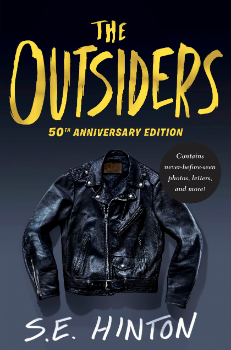
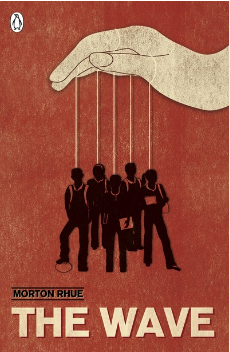
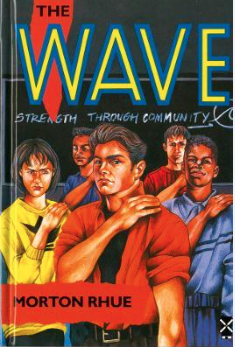
EXPLORE / TŪHURA learning intentions:
- We are EXPLORING the impact of the choices/decisions characters make in a range of text (Risky Business) by recognising that there are multiple perspectives in a text.
- We are EXPLORING the impact of the choices/decisions characters make in a range of text (Risky Business) by evaluating how they demonstrate key ideas and the purpose of exploring these themes.
- We are EXPLORING the impact of the choices/decisions characters make in a range of text (Risky Business) by empathising with characters and their experiences.
- We are EXPLORING the impact of the choices/decisions characters make in a range of text (Risky Business) by understanding that texts ask questions that cannot be answered.
- We are EXPLORING the impact of the choices/decisions characters make in a range of text (Risky Business) by identifying, discussing, and debating how the texts grapple with ideas and feelings that are difficult to articulate or navigate
- We are EXPLORING the impact of the choices/decisions characters make in a range of text (Risky Business) by analysing the key settings and how they have been selected by the author for effect
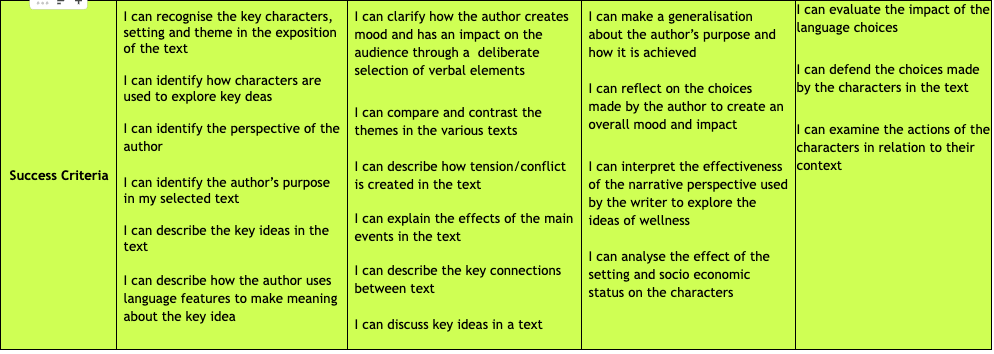
Activities

-
This week we will be moving into unpacking how the context of a character shapes their context.
EXPLORE / TŪHURA learning intentions:
- We are EXPLORING the impact of the choices/decisions characters make in a range of text (Risky Business) by recognising that there are multiple perspectives in a text.
- We are EXPLORING the impact of the choices/decisions characters make in a range of text (Risky Business) by evaluating how they demonstrate key ideas and the purpose of exploring these themes.
- We are EXPLORING the impact of the choices/decisions characters make in a range of text (Risky Business) by empathising with characters and their experiences.
- We are EXPLORING the impact of the choices/decisions characters make in a range of text (Risky Business) by understanding that texts ask questions that cannot be answered.
- We are EXPLORING the impact of the choices/decisions characters make in a range of text (Risky Business) by identifying, discussing, and debating how the texts grapple with ideas and feelings that are difficult to articulate or navigate
- We are EXPLORING the impact of the choices/decisions characters make in a range of text (Risky Business) by analysing the key settings and how they have been selected by the author for effect

Activities

-
As we looked at last week, decisions individuals make is dictated by external factors. So the questions remains - why do young people make choices that has a negative impact?
EXPLORE / TŪHURA learning intentions:
- We are EXPLORING the impact of the choices/decisions characters make in a range of text (Risky Business) by recognising that there are multiple perspectives in a text.
- We are EXPLORING the impact of the choices/decisions characters make in a range of text (Risky Business) by evaluating how they demonstrate key ideas and the purpose of exploring these themes.
- We are EXPLORING the impact of the choices/decisions characters make in a range of text (Risky Business) by empathising with characters and their experiences.
- We are EXPLORING the impact of the choices/decisions characters make in a range of text (Risky Business) by understanding that texts ask questions that cannot be answered.
- We are EXPLORING the impact of the choices/decisions characters make in a range of text (Risky Business) by identifying, discussing, and debating how the texts grapple with ideas and feelings that are difficult to articulate or navigate
- We are EXPLORING the impact of the choices/decisions characters make in a range of text (Risky Business) by analysing the key settings and how they have been selected by the author for effect
 .
.Activities
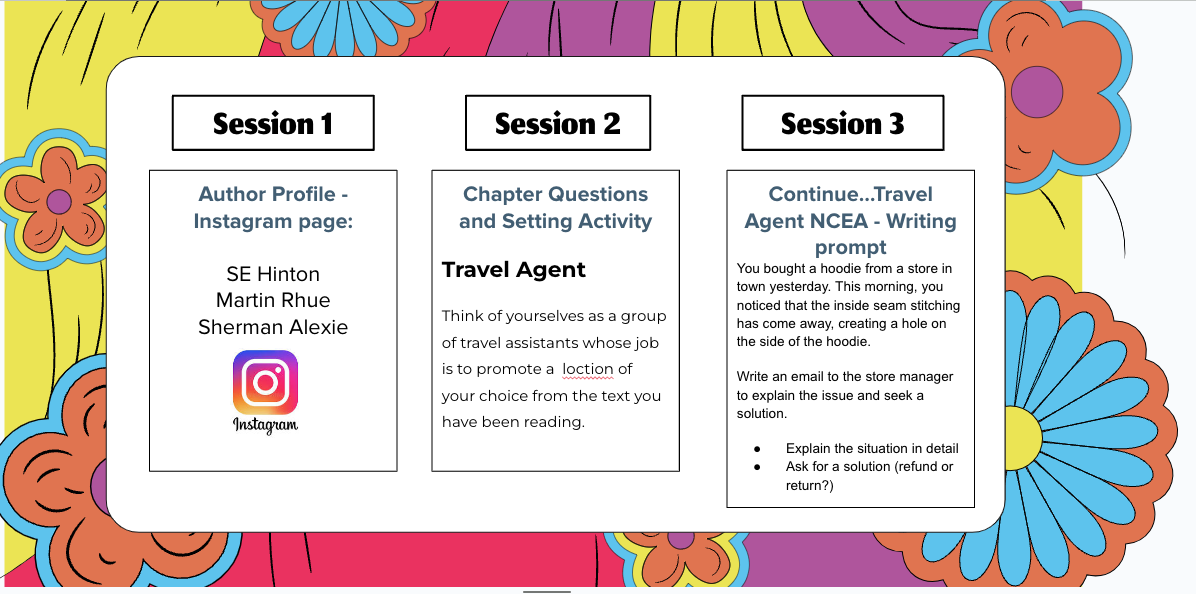
-
This week we will compare the choices/risks taken by characters in the novel and choices we make. At the same time we will be discussing, and debating how the texts grapple with ideas and feelings that are difficult to articulate or navigate.
EXPLORE / TŪHURA learning intentions:
- We are EXPLORING the impact of the choices/decisions characters make in a range of text (Risky Business) by recognising that there are multiple perspectives in a text.
- We are EXPLORING the impact of the choices/decisions characters make in a range of text (Risky Business) by evaluating how they demonstrate key ideas and the purpose of exploring these themes.
- We are EXPLORING the impact of the choices/decisions characters make in a range of text (Risky Business) by empathising with characters and their experiences.
- We are EXPLORING the impact of the choices/decisions characters make in a range of text (Risky Business) by understanding that texts ask questions that cannot be answered.
- We are EXPLORING the impact of the choices/decisions characters make in a range of text (Risky Business) by identifying, discussing, and debating how the texts grapple with ideas and feelings that are difficult to articulate or navigate
- We are EXPLORING the impact of the choices/decisions characters make in a range of text (Risky Business) by analysing the key settings and how they have been selected by the author for effect

Activities

-
Well done last week. Today the focus shifts to the themes raised in the text and develop an understanding that texts ask questions that cannot be answered.
EXPLORE / TŪHURA learning intentions:
- We are EXPLORING the impact of the choices/decisions characters make in a range of text (Risky Business) by recognising that there are multiple perspectives in a text.
- We are EXPLORING the impact of the choices/decisions characters make in a range of text (Risky Business) by evaluating how they demonstrate key ideas and the purpose of exploring these themes.
- We are EXPLORING the impact of the choices/decisions characters make in a range of text (Risky Business) by empathising with characters and their experiences.
- We are EXPLORING the impact of the choices/decisions characters make in a range of text (Risky Business) by understanding that texts ask questions that cannot be answered.
- We are EXPLORING the impact of the choices/decisions characters make in a range of text (Risky Business) by identifying, discussing, and debating how the texts grapple with ideas and feelings that are difficult to articulate or navigate
- We are EXPLORING the impact of the choices/decisions characters make in a range of text (Risky Business) by analysing the key settings and how they have been selected by the author for effect

Activities

-
This week our focus shifts to how the ideas developed and presented in the world of the text(s) relates to our own community, society, or the wider world
FOCUS / ARONGA learning intentions:
- We are FOCUSING on the emotional, physical and social impact of the choices/decisions that we make by comparing the range of perspectives presented in the text
- We are FOCUSING on the emotional, physical and social impact of the choices/decisions that we make by explaining the effect of the setting and other external factors on character development
- We are FOCUSING on the emotional, physical and social impact of the choices/decisions that we make by comparing and contrasting the characters and their motivation/decisions
- We are FOCUSING on the emotional, physical and social impact of the choices/decisions that we make different analytical lenses can reveal different ways of seeing a text and help us to read it in line with or counter to its creator’s intentions.
Success Criteria

Activities:
Google Classroom
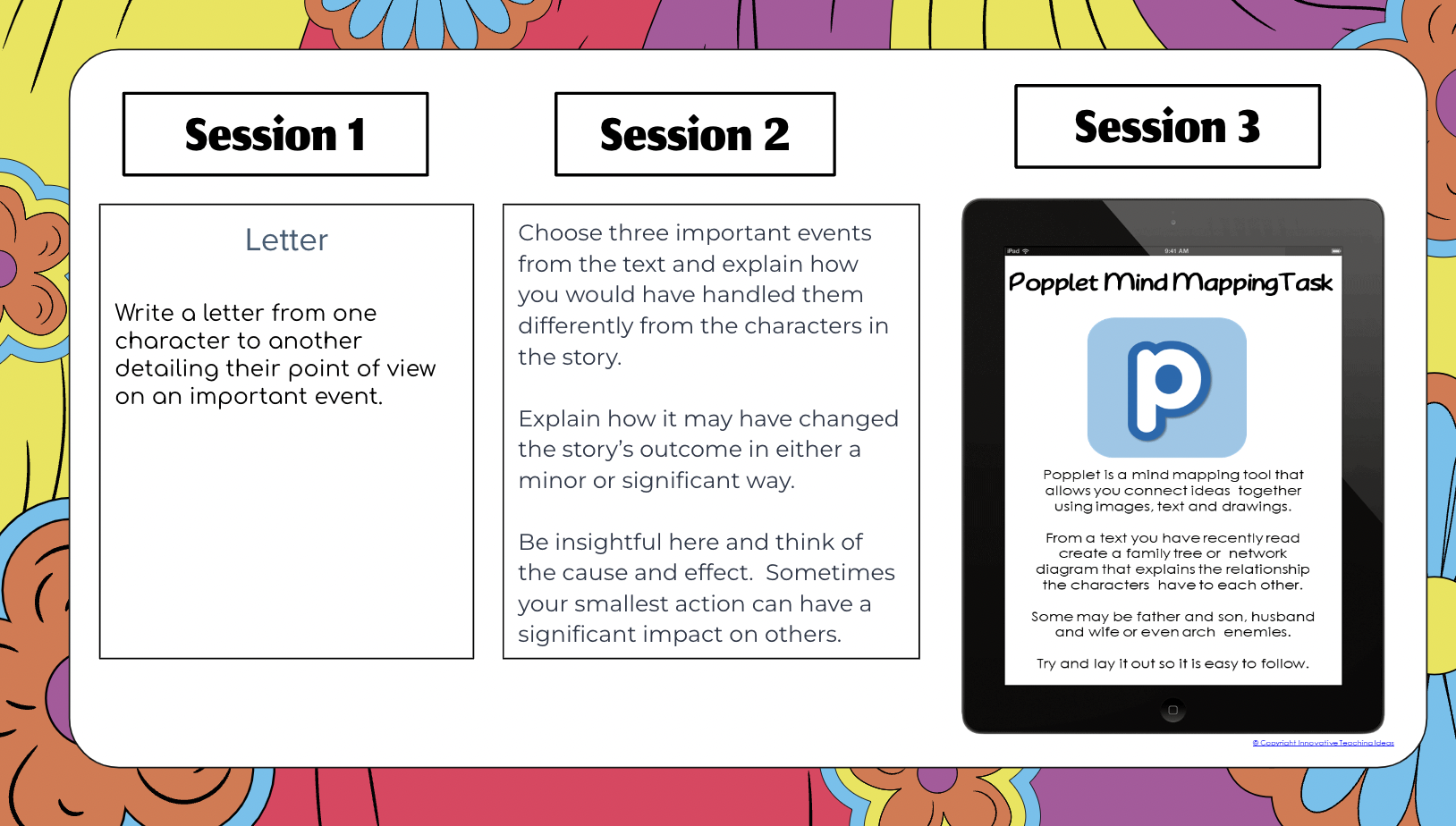
-
This week our focus shifts to how the ideas developed and presented in the world of the text(s) relates to our own community, society, or the wider world
FOCUS / ARONGA learning intentions:
- We are FOCUSING on the emotional, physical and social impact of the choices/decisions that we make by comparing the range of perspectives presented in the text
- We are FOCUSING on the emotional, physical and social impact of the choices/decisions that we make by explaining the effect of the setting and other external factors on character development
- We are FOCUSING on the emotional, physical and social impact of the choices/decisions that we make by comparing and contrasting the characters and their motivation/decisions
- We are FOCUSING on the emotional, physical and social impact of the choices/decisions that we make different analytical lenses can reveal different ways of seeing a text and help us to read it in line with or counter to its creator’s intentions.
Success Criteria

Activities:
Google Classroom
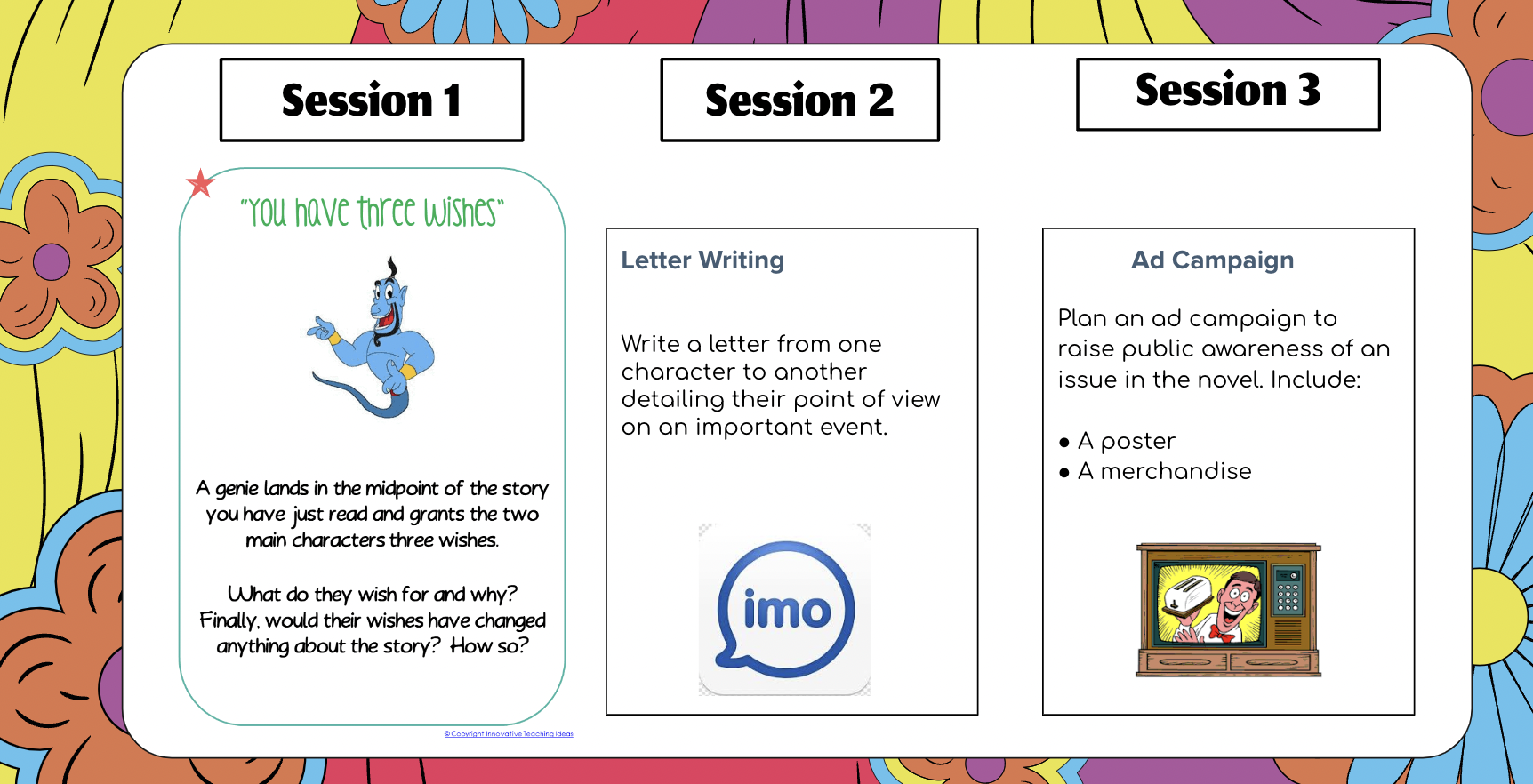
-
This week our focus shifts to how the ideas developed and presented in the world of the text(s) relates to our own community, society, or the wider world
FOCUS / ARONGA learning intentions:
- We are FOCUSING on the emotional, physical and social impact of the choices/decisions that we make by comparing the range of perspectives presented in the text
- We are FOCUSING on the emotional, physical and social impact of the choices/decisions that we make by explaining the effect of the setting and other external factors on character development
- We are FOCUSING on the emotional, physical and social impact of the choices/decisions that we make by comparing and contrasting the characters and their motivation/decisions
- We are FOCUSING on the emotional, physical and social impact of the choices/decisions that we make different analytical lenses can reveal different ways of seeing a text and help us to read it in line with or counter to its creator’s intentions.
Success Criteria

Activities:
Google Classroom
-
The next two weeks we will be developing our response to the text by analysing how the key ideas presented in the text relates to our world.
PLAN & DO / WHAKAMAHI learning intentions:
- We are PLANNING to apply our understanding of the key ideas in a text so that we can develop ideas about how the world of the text(s) relates to our own community, society, or the wider world
Success Criteria:
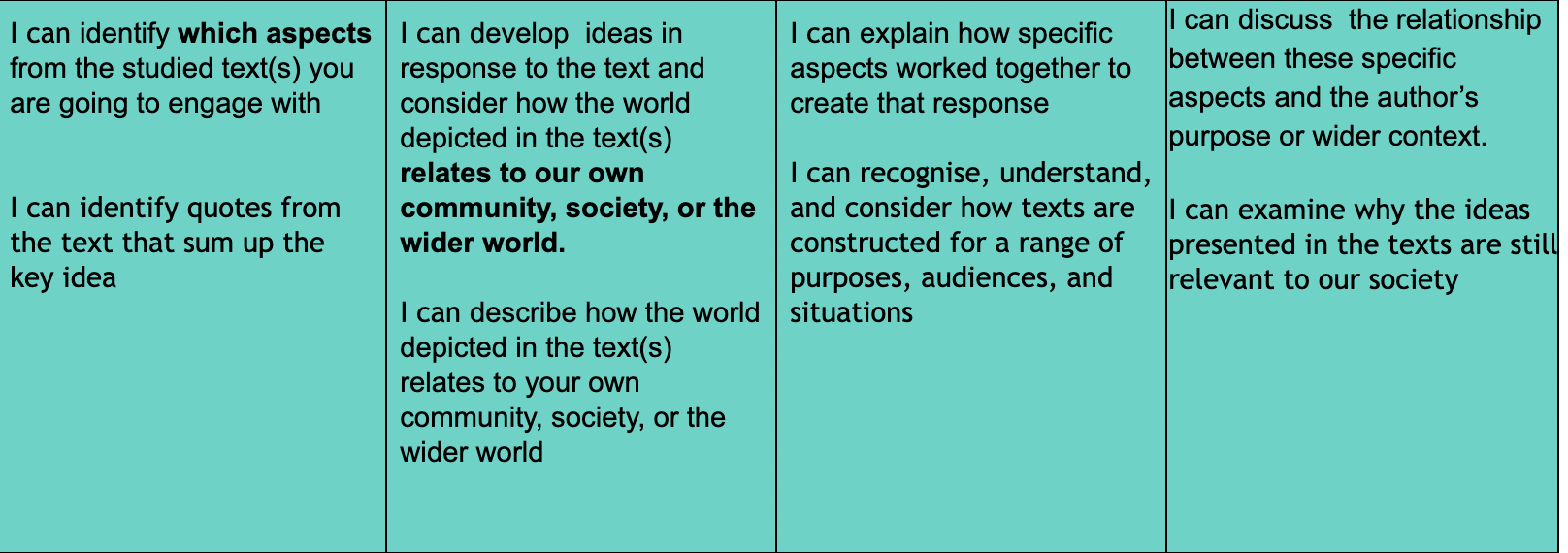
Activities
https://docs.google.com/document/d/15oymG0I2sDVrywLaxtu8iI8KKUnA9tozZJVpKGjnits/edit?usp=sharing
-
The next two weeks we will be developing our response to the text by analysing how the key ideas presented in the text relates to our world.
PLAN & DO / WHAKAMAHI learning intentions:
- We are PLANNING to apply our understanding of the key ideas in a text so that we can develop ideas about how the world of the text(s) relates to our own community, society, or the wider world
Success Criteria:

Activities
https://docs.google.com/document/d/15oymG0I2sDVrywLaxtu8iI8KKUnA9tozZJVpKGjnits/edit?usp=sharing
-
Welcome back to term 3. Our context is 'Have you got what it takes?' A Whakataukī that sums this context is “Whāia e koe te iti kahurangi ki te tūohu koe, me he maunga teitei”. The metaphorical meaning if this it: Pursue excellence – should you stumble, let it be to a lofty mountain. This whakatauki (saying) challenges us to pursue our dreams/our goals. It asks us to persevere through adversity and only bow our heads if the obstacle is truly great..
“How might we demonstrate the core values of the Olympic Games so that we can promote positive change and grow our greatness through kotahitanga ?”EXPLORE / TŪHURA learning intentions:
- We are EXPLORING the inequalities that exist in society and how we can promote positive change through the visual text “Remember the Titans” by recognising that directors use different verbal and visual language techniques to highlight how we all respond differently to challenges that we may encounter
Ako: Learning and Thinking Strategy
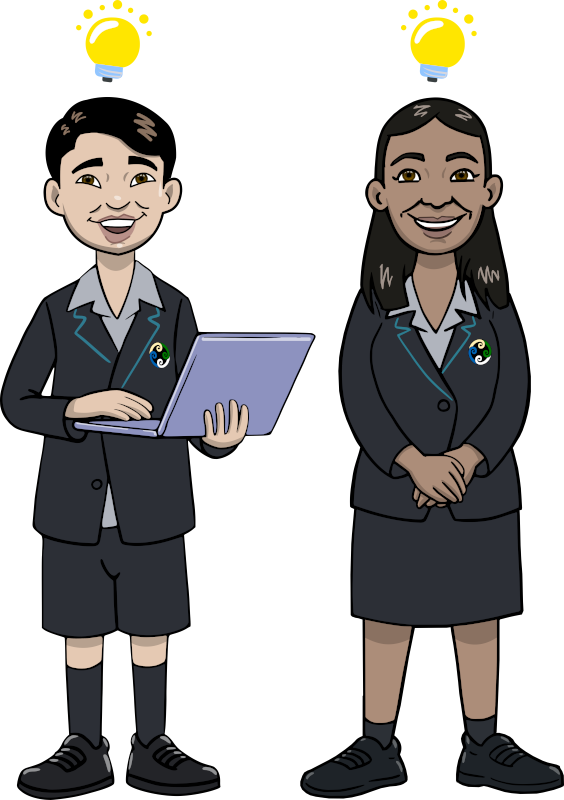
Success Criteria:

-
Welcome back to term 3. Our context is 'Have you got what it takes?' A Whakataukī that sums this context is “Whāia e koe te iti kahurangi ki te tūohu koe, me he maunga teitei”. The metaphorical meaning if this it: Pursue excellence – should you stumble, let it be to a lofty mountain. This whakatauki (saying) challenges us to pursue our dreams/our goals. It asks us to persevere through adversity and only bow our heads if the obstacle is truly great..
“How might we demonstrate the core values of the Olympic Games so that we can promote positive change and grow our greatness through kotahitanga ?”EXPLORE / TŪHURA learning intentions:
- We are EXPLORING the inequalities that exist in society and how we can promote positive change through the visual text “Remember the Titans” by recognising that directors use different verbal and visual language techniques to highlight how we all respond differently to challenges that we may encounter
Ako: Learning and Thinking Strategy

Success Criteria:

-
This week we will be focusing on the film "Remember the Titans". In order to understand the flm we must understand the Civil Rights Movement and analyse the Gettysburg Address.
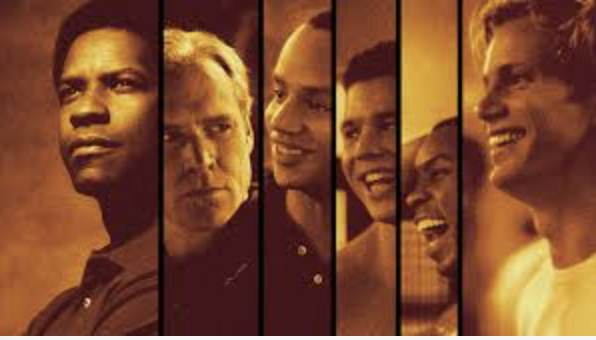
FOCUS / ARONGA learning intentions:
- We are FOCUSING on the inequalities that exist in society and how we can promote positive change through the visual text “Remember the Titans” by investigating a range of visual techniques and experimenting with the effect it has on the viewers
- We are FOCUSING the inequalities that exist in society and how we can promote positive change through the visual text “Remember the Titans” by collaborating with one another to discover how the visual techniques highlight the manner in which characters respond to challenges
- We are FOCUSING the inequalities that exist in society and how we can promote positive change through the visual text “Remember the Titans” by researching the symbols the director has employed to present the idea of discrimination and prejudice.
Success Criteria

-
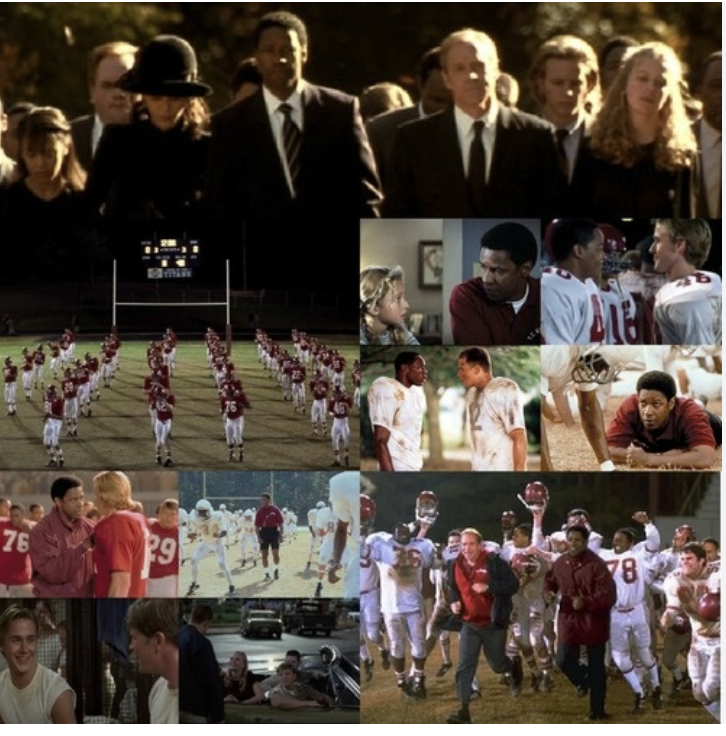
This week we will be focusing on the film "Remember the Titans". In order to understand the flm we must understand the Civil Rights Movement and analyse the Gettysburg Address.
FOCUS / ARONGA learning intentions:
- We are FOCUSING on the inequalities that exist in society and how we can promote positive change through the visual text “Remember the Titans” by investigating a range of visual techniques and experimenting with the effect it has on the viewers
- We are FOCUSING the inequalities that exist in society and how we can promote positive change through the visual text “Remember the Titans” by collaborating with one another to discover how the visual techniques highlight the manner in which characters respond to challenges
- We are FOCUSING the inequalities that exist in society and how we can promote positive change through the visual text “Remember the Titans” by researching the symbols the director has employed to present the idea of discrimination and prejudice.
Success Criteria

-
This week we will be focusing on the film "Remember the Titans". In order to understand the flm we must understand the Civil Rights Movement and analyse the Gettysburg Address.
FOCUS / ARONGA learning intentions:
- We are FOCUSING on the inequalities that exist in society and how we can promote positive change through the visual text “Remember the Titans” by investigating a range of visual techniques and experimenting with the effect it has on the viewers
- We are FOCUSING the inequalities that exist in society and how we can promote positive change through the visual text “Remember the Titans” by collaborating with one another to discover how the visual techniques highlight the manner in which characters respond to challenges
- We are FOCUSING the inequalities that exist in society and how we can promote positive change through the visual text “Remember the Titans” by researching the symbols the director has employed to present the idea of discrimination and prejudice.
Success Criteria

-
Well done for the past week. Keep up with the Literacy book in readiness for the CAA.
PLAN & DO / WHAKAMAHI learning intentions:
- We are PLANNING our visual texts to show our understanding of how language, literature, and texts so that is give us insights into ourselves and others and embody power relationships.
- We are PLANNING our visual texts to show our understanding of how language, literature, and texts so that we can respond to questions that are difficult to answer
- We are PLANNING our visual texts to present our understanding of how audiences differ by time and place.
- We are PLANNING our visual texts to create text that can contribute to national and global conversations through my original interpretations of texts and through the texts I create.
Success Criteria

-
This week we will analyse exemplars of Static Images and unopack what makes them successful. A commentary is essential to the analysis of the text.
PLAN & DO / WHAKAMAHI learning intentions:
- We are PLANNING our visual texts to show our understanding of how language, literature, and texts so that is give us insights into ourselves and others and embody power relationships.
- We are PLANNING our visual texts to show our understanding of how language, literature, and texts so that we can respond to questions that are difficult to answer
- We are PLANNING our visual texts to present our understanding of how audiences differ by time and place.
- We are PLANNING our visual texts to create text that can contribute to national and global conversations through my original interpretations of texts and through the texts I create.
Success Criteria

-
This week we will analyse exemplars of Static Images and unopack what makes them successful. A commentary is essential to the analysis of the text.
PLAN & DO / WHAKAMAHI learning intentions:
- We are PLANNING our visual texts to show our understanding of how language, literature, and texts so that is give us insights into ourselves and others and embody power relationships.
- We are PLANNING our visual texts to show our understanding of how language, literature, and texts so that we can respond to questions that are difficult to answer
- We are PLANNING our visual texts to present our understanding of how audiences differ by time and place.
- We are PLANNING our visual texts to create text that can contribute to national and global conversations through my original interpretations of texts and through the texts I create.
Success Criteria

-
PLAN & DO / WHAKAMAHI learning intentions:
- We are PLANNING our visual texts to show our understanding of how language, literature, and texts so that is give us insights into ourselves and others and embody power relationships.
- We are PLANNING our visual texts to show our understanding of how language, literature, and texts so that we can respond to questions that are difficult to answer
- We are PLANNING our visual texts to present our understanding of how audiences differ by time and place.
- We are PLANNING our visual texts to create text that can contribute to national and global conversations through my original interpretations of texts and through the texts I create.
Success Criteria

-
Opened: Friday, 13 September 2024, 12:00 AMDue: Saturday, 28 September 2024, 12:00 AM
-
Welcome back from the holidays. Would you believe that this is your final term at MHJC. So here we lay down the challenge to you: "How might we use the values & skills we have grown at MHJC so that we can be informed, responsible members of society?”
Whakataukī: “Mā te kimi ka kite, Mā te kite ka mōhio, Mā te mōhio ka mārama”
Metaphorical: Seek and discover. Discover and know. Know and become enlightened.
Literal: This whakatauki (saying) challenges us to view learning as a journey. It starts with a conscious effort to seek knowledge. Upon seeking, you will surely discover a brand new thing or see a familiar object in a totally new light. Eventually, the things you know will lead you to become wise beyond your years. Seek. Discover. Know. Be enlightened.EXPLORE / TŪHURA learning intentions:
- We are EXPLORING a range of visual and written text through unpacking the linguistic and structural choices made by the authors/poets by identifying the language devices and structural features used by text creators
- We are EXPLORING a range of visual and written text through unpacking the linguistic and structural choices made by the authors/poets by recognising that language devices are used to create an intended effect
- We are EXPLORING a range of visual and written text through unpacking the linguistic and structural choices made by the authors/poets by investigating the devices used by the author and analysing the effect it has on the viewers/readers
- We are EXPLORING a range of visual and written text through unpacking the linguistic and structural choices made by the authors/poets by interpreting the meanings of literary texts and their contexts, and explore texts beyond surface meanings to show deeper awareness of ideas and attitudes.
- We are EXPLORING a range of visual and written text through unpacking the linguistic and structural choices made by the authors/poets by recognising and appreciating ways in which writers use language, structure and form to create and shape meanings and effects.
Success Criteria

Resources
- Banqer High
- Career NZ
- Career Quest
-
Hello all. Well done for all the work you have done last week. This week we will focus on Poetry and Fiction Text. For those who have not completed CAA - Persuasive Writing
EXPLORE / TŪHURA learning intentions:
- We are EXPLORING a range of visual and written text through unpacking the linguistic and structural choices made by the authors/poets by identifying the language devices and structural features used by text creators
- We are EXPLORING a range of visual and written text through unpacking the linguistic and structural choices made by the authors/poets by recognising that language devices are used to create an intended effect
- We are EXPLORING a range of visual and written text through unpacking the linguistic and structural choices made by the authors/poets by investigating the devices used by the author and analysing the effect it has on the viewers/readers
- We are EXPLORING a range of visual and written text through unpacking the linguistic and structural choices made by the authors/poets by interpreting the meanings of literary texts and their contexts, and explore texts beyond surface meanings to show deeper awareness of ideas and attitudes.
- We are EXPLORING a range of visual and written text through unpacking the linguistic and structural choices made by the authors/poets by recognising and appreciating ways in which writers use language, structure and form to create and shape meanings and effects.
Success Criteria

Resources
- Banqer High
- Career NZ
- Career Quest
-
This week we will focus on Poetry and Fiction Text. For those who have not completed CAA - Persuasive Writing
EXPLORE / TŪHURA learning intentions:
- We are EXPLORING a range of visual and written text through unpacking the linguistic and structural choices made by the authors/poets by identifying the language devices and structural features used by text creators
- We are EXPLORING a range of visual and written text through unpacking the linguistic and structural choices made by the authors/poets by recognising that language devices are used to create an intended effect
- We are EXPLORING a range of visual and written text through unpacking the linguistic and structural choices made by the authors/poets by investigating the devices used by the author and analysing the effect it has on the viewers/readers
- We are EXPLORING a range of visual and written text through unpacking the linguistic and structural choices made by the authors/poets by interpreting the meanings of literary texts and their contexts, and explore texts beyond surface meanings to show deeper awareness of ideas and attitudes.
- We are EXPLORING a range of visual and written text through unpacking the linguistic and structural choices made by the authors/poets by recognising and appreciating ways in which writers use language, structure and form to create and shape meanings and effects.
Success Criteria

Resources
- Banqer High
- Career NZ
- Career Quest
-
Hello all. Well done for all the work you have done last week. This week we will focus on Poetry and Fiction Text. For those who have not completed CAA - Persuasive Writing
EXPLORE / TŪHURA learning intentions:
- We are EXPLORING a range of visual and written text through unpacking the linguistic and structural choices made by the authors/poets by identifying the language devices and structural features used by text creators
- We are EXPLORING a range of visual and written text through unpacking the linguistic and structural choices made by the authors/poets by recognising that language devices are used to create an intended effect
- We are EXPLORING a range of visual and written text through unpacking the linguistic and structural choices made by the authors/poets by investigating the devices used by the author and analysing the effect it has on the viewers/readers
- We are EXPLORING a range of visual and written text through unpacking the linguistic and structural choices made by the authors/poets by interpreting the meanings of literary texts and their contexts, and explore texts beyond surface meanings to show deeper awareness of ideas and attitudes.
- We are EXPLORING a range of visual and written text through unpacking the linguistic and structural choices made by the authors/poets by recognising and appreciating ways in which writers use language, structure and form to create and shape meanings and effects.
Success Criteria

Resources
- Banqer High
- Career NZ
- Career Quest
-
This week we will be working through your CVs and Application Letters as we get ready for Careers Week.
FOCUS / ARONGA learning intentions:
- We are FOCUSING on careers through developing a relevant CV and application letter to secure a work placement
Success Criteria

-
This week we will work through our CVs and Application letters
FOCUS / ARONGA learning intentions:
- We are FOCUSING on careers through developing a relevant CV and application letter to secure a work placement
Success Criteria




